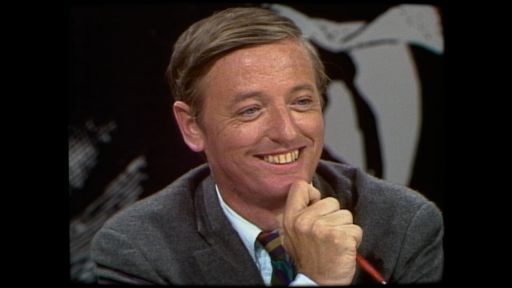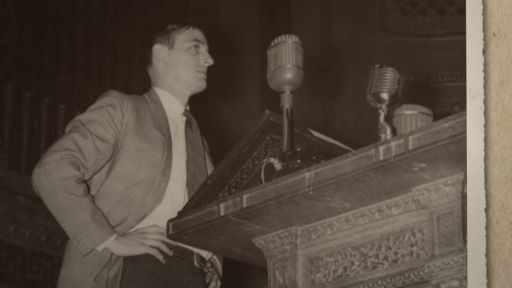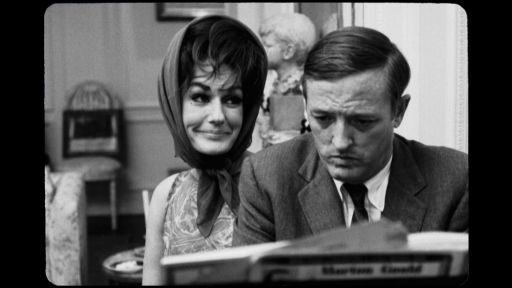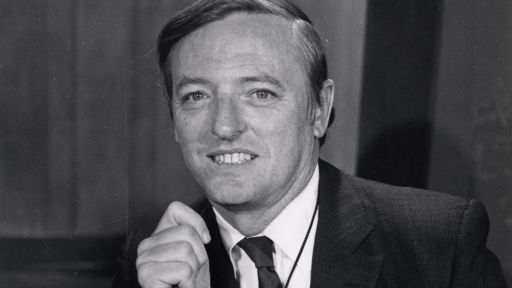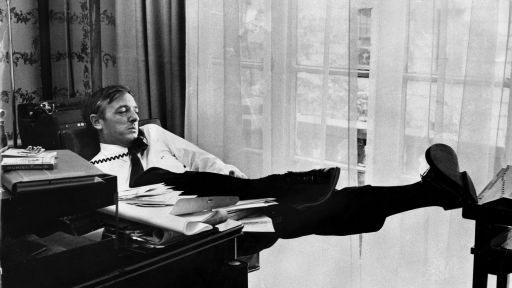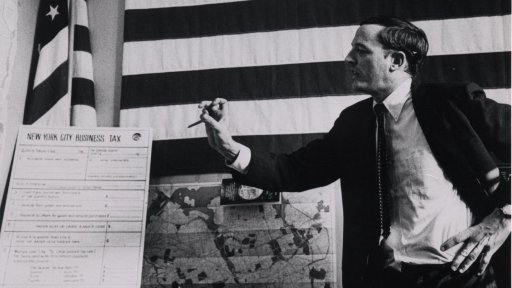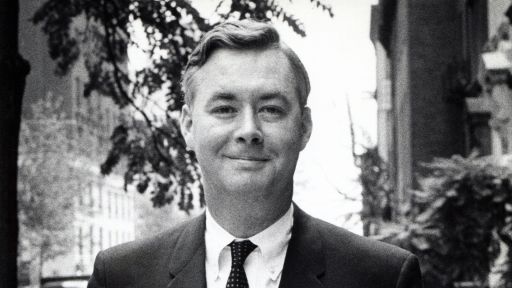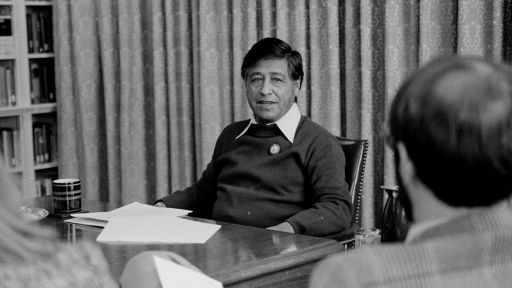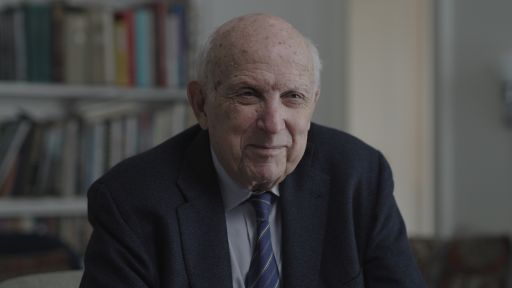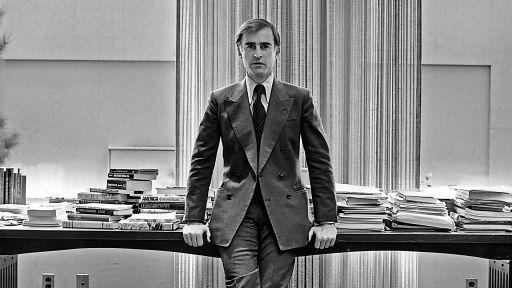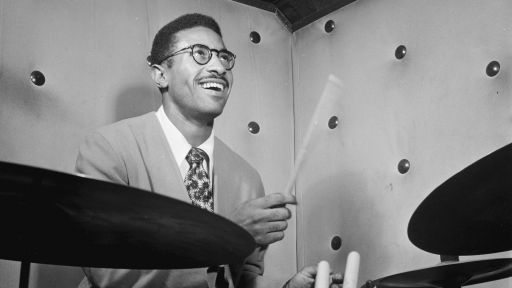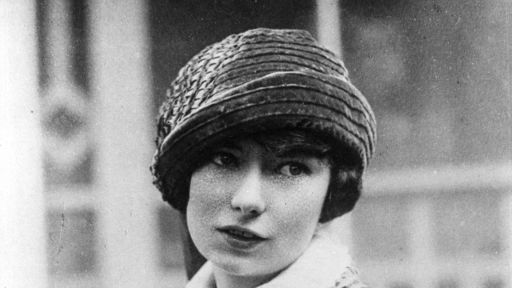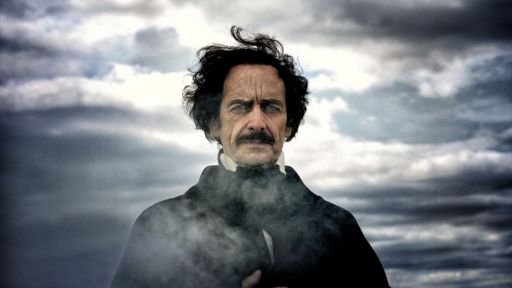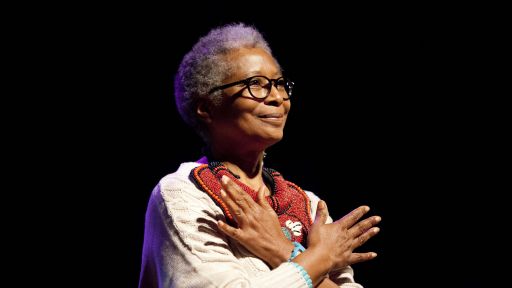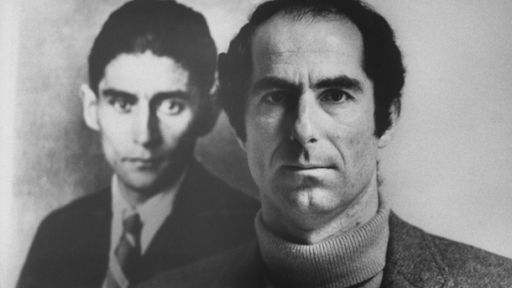TRANSCRIPT
♪♪ ♪♪ -Mr. Buckley, I've noticed that whenever you appear on television, you're always seated.
Does this mean you can't think on your feet?
[ Laughter ] -It's very, very hard to stand up carrying the weight of what I know.
[ Laughter ] [ Applause ] ♪♪ -And now will you welcome, please, a man who's been described in a million different ways.
-He's articulate, provocative, a scourge to some people and a hero to others.
-I always find him fascinating.
-Very, very strong opinions.
-One of the most controversial and charming men on television, Mr. William F. Buckley Jr. [ Applause ] -Bill Buckley was so refreshing.
He was so exciting.
-It seems to me that whoever said that was trying to be provocative.
Whether he is naturally or affectedly stupid, I don't know.
[ Laughter, applause ] -Whether you agreed with him and loved him or he enraged you, Buckley made everybody's blood run quickly.
-I think that you used the word "violence" with such slovenliness as to render yourself unintelligible.
-This is the William F. Buckley America knows best, the man someone called the "king of leer," grimacing or incredulous or disdainful.
-Mr. Buckley, you once called Harry Truman "the nation's most conspicuous vulgarian."
You said of General Eisenhower that, "When he touches a subject, every ray of light, every breath of air is choked out".
Of the Kennedy administration, I quote you, "There are not enough psychiatrists to cure this crazy administration."
And you've called President Johnson "Uncle Cornpone."
-I didn't say that about Kennedy.
I said the other three, though.
-Right.
-I'd be glad to elaborate on it.
[ Cheers and applause ] [ Flashbulb pops ] -Bill was so big that he wasn't one thing.
A political man, yes, but also a literary one, a provocateur, a public brawler, but also a kind of poet.
-He wanted to encompass as many forms of conservatism as he could.
-It certainly isn't just rich people.
It certainly isn't just poor people.
It certainly isn't just Westerners or just Middle Westerners.
There are conservatives everywhere I've been in America.
-It wasn't about personal power.
It was about building a movement.
-The conservatives paid one dollar each to see William F. Buckley Jr.
There was nothing fancy on the menu here, just hot tongue and cold shoulder for everything distasteful to the conservatives.
-Without William Buckley, conservatism, as we understand it, would never have happened.
-Buckley said that he was a revolutionary against the establishment, an intellectual revolutionary.
-I can't think of anyone who you would compare him to over the last three-quarters of a century who had the impact that he had on American political life.
To have built the kind of edifice of ideas and institutions that Buckley did is astonishing.
It's just astonishing.
[ Typewriter clacking ] ♪♪ [ Bell dings ] -Ready, Mr. Buckley?
-All set.
-Go.
-Why are the races unreconciled?
Why does poverty persevere?
Why are our governors indifferent to us?
Why are the young disenchanted?
Why do the birds sing so unhappily?
It is easy to be carried away.
And yet always there is a strain of seriousness, something in the system that warns us, warns us that America had better strike out on a different course rather than face another four years of asphyxiation by liberal promises.
[ Crowd shouting ] -There is no political movement that comes close to the American conservative movement, where you actually have a different idea about what the country should be like and then over time the country gets there.
And that's what happened with this conservative movement.
-Under liberalism, America hasn't prospered.
-Bill Buckley was one of its best writers, maybe its best debater.
He was its voice.
He was its face.
There's the Whitman line, "I contain multitudes."
Buckley did contain multitudes within himself.
-This is William F. Buckley Jr. in New York.
Perfect.
-Good.
-[ Laughs ] -My father was a man of many parts.
If you asked me what I was most proud of, it was his generosity of soul.
I have a hard time imagining Pup sitting down at his desk and thinking, "I shall become a leader," you know?
I think it evolved much more organically.
Someone once wrote my father and said, "Mr. Buckley, what is the secret to happiness?"
And he wrote back, "Don't grow up."
He was raised in, I guess you could call it a bubble.
It was sort of -- You could call it Buckley World.
In 1923, the family bought a house in Sharon, Connecticut, and it was called Great Elm because there was an enormous elm tree.
I think it was the largest and oldest elm in Connecticut.
-Great Elm was a world unto itself.
It's this huge estate, filled with six pianos so all the children could practice on their own.
The family was unbelievably insular.
Nobody had to go outside of the walls in order to encounter any part of life.
-They don't go to the local school.
They have a school that they hold within their house.
-And they have a variety of tutors in academic subjects, tutors in ballroom dancing and horse riding.
-They were learning French, learning Spanish, learning how to sail, learning how to hunt.
-It was like a summer camp and a liberal arts college right there at the estate.
-The Buckley children had an opportunity to inspire each other, to challenge each other, driven by their father.
He really was sort of the headmaster of this academy.
-My grandfather was a fascinating guy.
He grew up dirt poor.
He went down to Mexico and got into the oil business.
And it was boom and bust.
Eventually, he found a lot of oil.
-Will Buckley was searching for fortune, but he got caught up in a lot of revolutionary movements in Latin America, and I think that instilled in him a distaste for disorder and a fear of revolt, and he communicated that to his children.
-My grandmother was an enchanting woman.
We called her Mimi, Aloise Steiner Buckley.
Deeply, deeply religious.
She gave my father a religious faith that was the molten core of his being, and I think you could extrapolate from that everything about my father.
-That devotion ends up being kind of at the core of Buckley's understanding of what love is -- love of one's friends, one's family, and one's country.
-This was Will Sr.'s pedagogical idea, to say, "I'm not going to entrust this to government, to take care of my children.
I'm going to create this perfect brood of young people."
He's trying to extract the very best from his children, challenging them again and again.
Bill Buckley Jr. really learned how to defend himself and to stake out positions which nobody else had staked out.
-There were frequent guests, and among the guests was a major influence on Buckley, the literary journalist Albert Jay Nock.
Nock was a former Anglican priest who abandoned his family to become an intellectual aristocrat.
-Nock's theme was essentially civilization was in decline, and it had come down to what he called "the remnant," which was a very limited number of people who could really be trusted to lead wisely.
-That central thought that there is a noble remnant of highly educated men, in particular, who were going to stand apart from society, who could see things that other people couldn't see, loomed very large for Buckley.
And it really becomes part of the sensibility of the conservative movement.
-♪ And the morning light we hail ♪ ♪ We will sing with cheerful hearts ♪ ♪ Songs of home and of Yale ♪ ♪ And of dear old Yale, la la la la ♪ -For more than 200 years, Yale, founded in the conviction that the preservation of freedom demands educated men... -So, Bill Buckley was in the class of 1950 at Yale, and he enters Yale at a very unusual time in its history.
-My father was drafted.
He was in the Army, and this was the first class at Yale that was almost entirely veterans.
A lot of these men had been delayed by this event called World War II, and they wanted to get on with it.
And so my father hit the ground running.
-He was always a great debater.
He was tapped for Skull and Bones, which was the oldest and most prestigious of Yale's senior societies.
He was popular with friends and faculty.
Bill Buckley was welcomed into every circle at Yale.
And, of course, a lot of these things came because he was named the chairman of the Yale Daily News.
-First you'll get training, intensive training on a near-professional daily.
You'll learn how to go out and get the news, and then you'll learn how to come back here and write the news and write it fast.
-The Yale Daily News had been, you know, a very nice, typical college newspaper.
Under Buckley, it really became the center of controversy and debate on the issues of the day.
-He would pound out these fiery, but always witty, denunciations of socialism and rampant atheism that he saw at Yale.
-Everybody read his editorials.
He was fearless.
He criticized his professors at Yale by name, and he didn't pull punches.
-Professor Kennedy has made a cult of anti-religion.
It is obvious that in undermining religion through bawdy and slapstick humor, he is guilty of injustice to and an imposition upon his students and the University.
-He knew he was going to get under the skin of faculty and administration and most students.
That didn't bother him.
Au contraire, he delighted in it.
[ Marching band plays ] There is an annual tradition at Yale called the Alumni Day speech.
And because of Buckley's eloquence and brilliance, the Yale administration invites him to give the speech.
Then they have second thoughts.
"Wait a minute.
We have just invited a critic of Yale and of the Yale administration to give a speech.
What is he going to tell the alumni?"
Buckley sends them the draft.
They call him, and they want lots of changes.
He realizes what's happening here, which is they wish to clip his wings.
So, he says, "Well, I'll tell you what.
I can give my speech the way I wrote it or not.
You decide."
They say, "Okay, thanks.
We'll find somebody else."
[ Typewriter clacking ] [ Bell dings ] There's an old saying that "revenge is a dish best served cold."
You didn't like the speech?
You're going to like the book even less.
♪♪ -♪ I love you, man ♪ ♪ Every bit of you I'll take ♪ -In those days, a lot of men met their wives through their sisters.
And indeed, my father's sister Trish roomed with this debutante from Vancouver named Patricia Taylor.
And she immediately sent word to all the siblings -- "I've found the perfect girl for Billy.
She's regal."
-♪ ...is pain ♪ ♪ I won't give up ♪ -They had gone to a prom together, and Bill used to take a book and put it in his jacket pocket in case -- you know, in case -- -In case he was bored?
-Yes.
But needless to say, he never took it out.
-♪ The one I want ♪ -They had about three dates.
One thing led to another.
They had the largest wedding in Vancouver history.
He was dashing.
She was gorgeous.
These two were made for each other.
-♪ ...the same ♪ ♪ It's forever better when there's a flame ♪ [ Typewriter clacking ] ♪♪ -I was 24 when I began writing the book, freshly married.
[ Bell dings ] Rumors that the book was being written had got around.
They caused considerable consternation at Woodbridge Hall, which is Yale's White House.
-"God and Man at Yale" came out in 1951, and it was really a full-throated attack on the university.
-I propose simply to expose what I regard as an extraordinarily irresponsible educational attitude, that, under the protective label "academic freedom"... -"God and Man at Yale" is a critique of an establishment gone wrong.
It's, "You people out there in America, here's what the elites are doing."
-They mock Christianity.
They don't uphold what he calls "economic individualism," you know, free markets.
-The institution derives its moral and financial support from Christian individualists and then addresses itself to the task of persuading the sons of these supporters to be atheistic socialists.
-It was a book with a naturally limited audience until Yale decides that they're gonna fight back.
-Yale engages in a campaign to rebut Buckley and to try to challenge him.
-They recruited authors to write responses, including McGeorge Bundy, one of their most distinguished alumni.
-Bundy reviewed the book and said, "Mr. Buckley has disgraced God, and he has disgraced Yale."
And then he called him "a twisted young man."
He essentially had attacked the world he came from.
But it put him on the map.
And to this day, I get royalty statements.
♪♪ ♪♪ -The relentless sweep of communism has radically changed the map of Europe.
-Buckley graduated from Yale into a world where the struggle against communism and socialism were already the central issues of American politics.
-The growing menace of communism arouses the House of Representatives Un-American Activities Committee.
-Are you a member of the Communist Party, or have you ever been a member of the Communist Party?
-It's unfortunate and tragic that I have to teach this committee the basic principles of Americanism.
-That's not the question!
-These Communists could be anywhere.
They could be your neighbor.
They could be in your own family.
Communism was like a virus.
All it took was, like, one little germ that could infect the entire body.
-Alger Hiss, former State Department executive.
Mr. Hiss is accused of being a former Communist and, before news cameras, faces his accuser.
-I am not and never have been a member of the Communist Party.
-There was a basis for anti-Communist hysteria in the country.
[ Cheers and applause ] But Republicans used it as a political weapon against the Democrats.
And one of the key people in doing that was Joe McCarthy.
-One Communist on the faculty of one university is one Communist too many.
[ Crowd cheering ] -McCarthy realized that the more people he accused, the more power he had.
-The Communist activities of Miss Kenyon are deep-rooted.
Have you ever discussed confidential material with a member of the Communist Party?
...aiding the Communist Party.
Communist infiltration...
There is no academic freedom where a Communist is concerned.
-Anyone who questions his methods he could claim was either helping the Communists or was a Communist.
-Why don't you give me a chance to state this?
-You'll answer these questions.
-But McCarthy overreaches.
He goes after the Army.
And that really is his undoing.
-Very grave charges have been made against the Army.
-And the Senate turns on him and holds televised hearings that really kind of turn him into a buffoon on the national stage.
-I have offered to go before any committee, do anything you ask.
You're not fooling anyone at all, I'm sure of that.
-Senator -- Senator, let me tell you something.
The chair believes that the American people have had a look at you for six weeks.
You're not fooling anyone, either.
[ Laughter ] -McCarthy's record, we have, in my judgment at this moment, tended to distort.
-In what way have we distorted McCarthy's record?
-In this way, we have exclusively centered on the number of people about whom he exaggerated, whereas, as you know, my own position, and I think well-documented in a hefty book, is that... -Buckley's second book came out just as McCarthy was essentially driven out of respectable political life.
-I would say McCarthy did uniquely stand up on the world stage, on the United States stage, address himself to a real problem... -Buckley acknowledges that McCarthy has used questionable methods, that he has lied.
-...forgive him for his occasional excess.
-But, for the most part, he says, "That's okay, because McCarthy's doing this for the right cause and because people on the other side are so much worse."
To Buckley, the idea was that the political establishment had been so captured by a form of liberalism that, in fact, the mantle was going to have to be taken up somewhere else.
[ Camera shutter clicking ] Buckley thought of himself as a lone figure battling forces much more powerful than he was, and that outsider identity really fueled his ambition and became really central to the movement itself.
[ Airplane engine roaring ] [ Intercom bell dings ] -Buckley believed that ideas rule the world, and when he looked at the history of the United States, he had seen good ideas, the ideas of the American founding, replaced by bad ideas, the ideas of Franklin Delano Roosevelt.
The overall idea, that big government was here to stay, was not something that was challenged.
-Eisenhower answers America.
-Even Republicans like Eisenhower bought it.
-I stand for expanded social security and more real benefits.
If I'm president, I'll give you older folks action, not just sympathy.
-If you had talked about conservatives in the early 1950s, people wouldn't have been clear what you were even talking about.
There really wasn't anything called "the conservative movement."
So it was really something that Buckley created de novo.
-Buckley recognizes the role that magazines played in the first part of the 20th century in helping shape the American left.
So, what Buckley really wants is a magazine of his own.
-Bill starts National Review, but it's far more than a magazine.
It was, he felt, the way by which a movement could be created and could challenge the prevailing liberal zeitgeist.
-As he says in the opening editorial, the role of National Review is to stand up for the principles and values that informed the founding of the United States.
And for Buckley, that meant a free market.
It meant a limited government.
And overall, it meant implacable anti-Communism.
-But you can't do a magazine all by yourself.
You got to have other people to run it.
So, who does he find?
Well, he finds this wonderful alliance of ex-Communists, including Russell Kirk, the most famous of them.
He finds James Burnham.
He was an American Trotskyist.
Bill found his college professor Willmoore Kendall.
He was both a very compelling man and an extremely difficult one.
There was Willi Schlamm, who was a Austrian émigré.
Frank Meyer becomes the book review editor, and he was nocturnal.
You know, he'd wake up as the sun was going down and then he'd go to sleep as it was rising back up.
-And then there's the prize they all want, the most famous ex-Communist in America, Whittaker Chambers.
-Mr. Hiss represents the concealed enemy against which we are all fighting and I am fighting.
-These men don't like each other very much.
They're factions.
But what Buckley sees is that there are many things upon which these factions disagree, but they can be united by what they oppose.
And so Buckley thinks of anti-Communism as the glue that can hold these factions together.
[ Car engines revving ] -At that time, National Review was at 35th Street in Manhattan.
It was an old apartment building, so every office was kind of small.
[ Toilet flushes ] There were lots of bathrooms, an unusually large number of bathrooms.
-Buckley spends a great deal of his time in New York City, where he works at editing his magazine, National Review.
His sister Priscilla is managing editor of the magazine.
-It was a real -- I try to avoid the word "ratty," but it was kind of genteely shabby.
-With Buckley at this editorial meeting is a who's-who of conservatism.
James Burnham, the author and political philosopher... -Buckley took this ragtag bunch of competing, inconsistent, and warring ideas.
He brought them under one tent.
-Make it to Latin America unmolested.
[ Laughter ] -Buckley was able to say to them, "What you have to say matters, and I want to provide you with a platform to say it, and we can be founding fathers of a conservative movement."
-At this time, it gives me great pleasure to present Mr. William Buckley Jr. [ Applause ] -By the early '60s, Buckley had lectured on hundreds of college campuses in 45 out of the 50 states.
-Ladies and gentlemen, I'm glad to be here.
-What he wanted to do was create a new generation of conservatives.
He met young people all the time.
And what he found was they liked him because he was anti-establishment.
-That American resistance by the minority is nowadays more remarkable than American acquiescence by the majority.
-Buckley had a sense that building a movement from the youth up was a key way to pushing forward your ideas.
So, he says to a bunch of young, conservative college students, "Why don't I invite you to my father's house in Sharon, Connecticut, and we will discuss what this looks like?"
♪♪ -We came together that weekend and I think really made some history by forming YAF.
Buckley, the maker of a movement, he was sort of there as a validating presence.
"This is serious, guys."
He wants us to be part of this movement.
-The Young Americans for Freedom claims 51,000 members on more than 500 college campuses.
-We all talked like Bill.
We tried to dress like Bill.
-...plenty in shirts and ties.
-We read the things that he read.
-Free love or LSD doesn't turn them on, but conservative heroes like William Buckley do.
-We caught some of his conviction, "Hey, we really can change things."
Looking around at the movement, we could see that, "Okay.
We've got Bill Buckley, we've got National Review, but we need a political figure.
Who do we got?"
[ Country music plays ] Then along comes Barry Goldwater out of Arizona, riding a palomino horse, looking like a not-so-distant cousin of John Wayne.
We fell in love with Barry Goldwater.
-America's greatness is the greatness of her people, and let this generation then make a new mark for that greatness.
-For some reason, young Republicans are much quicker on the trigger in expressing their ideas of what the Goldwater chances are than older Republicans.
-Well, I don't think of him so much really as a politician but just as a man.
I'm very impressed with him.
-I think by a portion of something like two to one, the Republican rank and file doesn't want Goldwater as the nominee.
So what YAF does is they take over the Republican Party.
-We want Barry!
We want Barry!
[ Cheers and applause ] -The Republican National Convention reaches San Francisco to name a presidential nominee for 1964.
-This must've been the perfect moment for Buckley.
And as he drives to the convention center, he sees the energy in the streets.
He sees the youthful excitement for Barry Goldwater, and his conservative movement is finally happening.
-For more than a half-hour, the Goldwater backers whoop it up for the senator.
Their overwhelming majority here is no accident.
-Goldwater wins the nomination.
[ Crowd cheering ] He was somewhat a new personality to most American voters.
And so they're waiting for him to introduce himself to them.
-I accept your nomination with a deep sense of humility.
-Goldwater slits his own throat in his acceptance speech.
-I would remind you that extremism in the defense of liberty is no vice.
[ Cheers and applause ] -He is basically saying, "Extremism is okay with me."
-And let me remind you also that moderation in the pursuit of justice is no virtue.
[ Cheers and applause ] -Americans at the time were concerned about a presidential candidate who seemed extreme.
These were high-stakes times, the Cold War.
-Quite quickly, Goldwater becomes tagged as someone who is essentially the candidate of paranoid conspiracists of the John Birch Society.
-The John Birch Society is a group of Americans who have joined together to combat the evil forces which now threaten our country, our lives, and our civilization.
-The John Birch Society was founded by Robert Welch, who was, among other things, a candy magnate.
-He was famous for Junior Mints, Milk Duds.
Made a fortune.
-The John Birch Society was staunchly, incredibly anti-Communist.
-We have got to deceive the international Communist world control conspiracy, and that we will do.
-The Birchers were conspiracy theorists.
They thought Dwight Eisenhower was a Communist.
And so Buckley recognized that if the Birchers were to become the face of American conservatism, that would doom the prospects of the movement.
-What's the National Review's view of groups like the John Birch Society, Mr. Welch, some of the even more extreme groups?
-There seems to be no lunacy of which Robert Welch is incapable.
-Buckley was concerned about the respectability of the conservative movement with educated, middle-class Americans.
If they see something that they consider to be ridiculous and pathological, then they're going to pass by crackpot alley and go all the way over to the Democrats.
-Robert Welch is ill-equipped to lead a national political movement.
On the other hand, it is wrong, in my judgment, to anathematize every member of the John Birch Society.
-On the other hand, he knows that a lot of his subscribers to National Review are Birchers.
In fact, at least three people who are on the National Review masthead were members of the John Birch Society.
-So, he had to tread carefully.
-I would assume that you would also be counting on the fervor of people such as Welch and people in the Birch Society.
-Oh, sure, sure, sure, sure.
Just as Johnson has fervently working for him the Communists in this country.
-This is something we see again and again in the history of conservative politics, riding the tiger.
We can corral or control these unruly popular energies.
We can polish them up a little bit.
We can direct them, even, hopefully.
-But the damage had already been done.
-People called Goldwater a Nazi.
Psychiatrists came out to say that he was mentally unfit for the presidency.
-Bill Buckley and everyone who knew anything knew the Goldwater campaign is dead on arrival.
How much of that Goldwater humiliation is going to rub off on conservatism?
That is Buckley's chief concern.
-You feel, then, that Goldwater has no chance?
-No, you asked me if I thought he was gonna win.
I said, "No, I don't think he's gonna win."
-Buckley did, I think, a thing that you would never see today.
He gave a speech where he said, "Barry Goldwater is going to lose this election, and we need to think about how we're going to recover from this."
-The point is to win recruits whose attention we might never have attracted but for Barry Goldwater.
To infuse the conservative spirit in enough people to entitle us to look about on November 4th not at the ashes of defeat, but at the well-planted seeds of hope, which will flower on a great November day in the future.
-That was Buckley's role -- to keep the factions together, to keep hope alive, to have everyone looking to the future, and also not ever to give up.
[ Bells tolling ] -Well, here we are in the debating hall of the Cambridge Union for what could prove one of the most exciting debates in the 150 years of the Union history.
Any moment now, the president will be leading in his officers and his distinguished guests, and the debate will begin.
[ Applause ] -The house was absolutely packed.
And, of course, it was being televised, so there was undoubtedly a sense of a special occasion.
-Mr. William Buckley has the reputation of possibly being the most articulate conservative in the United States of America.
-Buckley is tall and very white and sort of in his proper attire for the debate.
Buckley had been formally debating since the crib, practically, and there he is, in his element.
What will this voice of conservatism have to say about race and civil rights?
-A few years earlier, in 1957, National Review publishes an editorial, "Why the South Must Prevail."
Buckley phrases the question, "Is the South justified in keeping its Black citizens from voting and therefore politically controlling the region?"
He writes, "The sobering answer is yes.
The White community is so entitled because, for the time being, it is the advanced race."
-It's not, perhaps, surprising that Buckley is defending Southern segregationists in National Review.
He was very sympathetic to the South.
His mother was a Southerner.
They were frequent visitors to South Carolina, where they had a winter home.
There were maids and serving people.
That was the reality he grew up with, and he didn't really question it.
-It is unpleasant to adduce statistics evidencing the cultural superiority of White over Negro, but it is a fact.
Reasonable limitations upon the vote are not exclusively the recommendation of tyrants.
-One of the slogans of the civil rights movement in those days was "Freedom Now."
Buckley's slogan for the civil rights movement would've been "Some freedom, one day, when you're ready."
"You cannot be a full citizen until you're ready, and we will be the ones in charge of making you ready.
And we will tell you when you're ready."
[ Applause ] -Mr. James Baldwin is hardly in need of introduction.
His reputation, both as a novelist and as an advocate of civil rights, is international.
-James Baldwin at that point had become one of the most famous writers in the world.
[ Applause ] He was really second only to Martin Luther King as a face associated with that phase of the civil rights revolution.
So, there he is, invited to the world's oldest debating society to debate this motion, is the American dream at the expense of the American Negro?
-Good evening.
It would seem to me the proposition before the house, when I put it that way, "Is the American dream at the expense of the American Negro?"
And that one's response to that question has to depend in effect on where you find yourself in the world.
This means in the case of an American Negro, from the moment you are born, since you don't know any better, every stick and stone and every face is white, and since you have not yet seen a mirror, you suppose that you are, too.
It comes as a great shock around the age of 5 or 6 or 7 to discover the flag to which you have pledged allegiance, along with everybody else, has not pledged allegiance to you.
It comes as a great shock... -I was moved by it.
And the people around me were moved by it.
Because I could feel his personal pain, which he didn't hide.
-Isn't 400 years enough?
400 years, at least three wars.
The American soil is full of the corpses of my ancestors.
Why is my freedom or my citizenship or my right to live there, how is it conceivably a question now?
-What he said to everybody is, "I personify the pain of my people.
And I'm telling you, I am hurt."
-Until this moment, there is scarcely any hope for the American dream because the people who are denied participation in it by their very presence will wreck it.
And if that happens, it's a very grave moment for the West.
Thank you.
[ Applause ] ♪♪ -A moving moment now.
The whole of the Union standing.
Never seen this happen before.
[ Applause continues ] ♪♪ Now we have Mr. William Buckley, who will need all his skill to establish ascendancy over his audience, which has clearly been so deeply moved by the preceding speaker.
-Thank you, Mr. President.
Gentlemen, it is impossible, in my judgment, to deal with the indictment of Mr. Baldwin unless one is prepared to say to him the fact that your skin is black is utterly irrelevant to the arguments that you raise.
-Buckley starts out by saying that the greatest insult to James Baldwin is to treat him as a Black person.
-I propose to pay him the honor this night of saying to him, "Mr. Baldwin, I am going to speak to you without any reference whatever to those surrounding protections which you are used to in virtue of the fact that you are a Negro."
-At first you think, "Okay, what is he saying?"
Is he saying, "I'm not gonna treat him with the kind of disrespect and indignity that Baldwin has just described in his speech?"
No, Buckley's actually saying Baldwin gets treated with a kind of deference out of a sense of white guilt.
-We have done a great deal to focus on the fact of white discrimination against Negroes.
But the other problem is the failure of the Negro community itself.
There are a great many schools who are anxious to train Negroes.
There are scholarships available to put them through.
But, in fact, that particular energy for some reason is not there.
-He was pulling out the old card of saying, "We've done everything we can to make it possible for all people to rise on the basis of their merit, but the Black family just hasn't got it together."
-What, in fact, is it that we Americans ought to do?
What are your instructions that I am to take back to the United States, my friend?
-It was Buckley who asked the question, "What can we do?"
So I stood up and said, "Well, I'll tell you what you can do."
One thing you might do, Mr. Buckley, is let them vote in Mississippi!
[ Applause ] -It is much more complicated, sir, than simply the question of giving them the vote.
Booker T. Washington said that the important thing where Negroes are concerned is not that they hold public office, but that they be prepared to hold public office, not that they vote, but that they be prepared to vote.
I think actually what I would do is lift the standards of the vote so as to disqualify 65% of the white people who are present... -Buckley meant that there should be an intellectual aristocracy, an inherited and mostly white aristocracy.
-It goes back to this idea of the remnant that the Buckley children were taught.
I think Buckley always thought of himself as this kind of guardian of a particular conception of Western culture, of American civilization.
And that runs all the way through his political life as a crucial idea.
[ Applause ] -I knew that Buckley would lose the debate at that point, because he had showed his true colors.
-He is an elitist and he's an anti-democrat.
-Voted in favor of the motion, 544 persons, and against, 164 persons.
The motion is therefore carried by 380 votes.
-It's an overwhelming victory for Baldwin.
Buckley, for the next 40 years, continually took the position that he may have lost the vote, but he did not lose the debate.
♪♪ [ Clapping, indistinct singing ] ♪♪ -1965 in Selma is the moral high point of the civil rights movement.
The civil rights marchers marching across the bridge only to be dispatched without warning.
[ People shouting ] It's at this moment that Buckley is invited to address 6,000 New York City police officers.
He decides to use this speech to talk about Selma.
[ Applause ] -Thank you, Mr. Sheldon, Mr. Newman.
-He talks about the standoff at the Edmund Pettus Bridge and he makes it known his sentiment is with the police.
-...extemporaneously.
-The speech was, "All of America saw the police charge at the demonstrators and the blood on the bridge.
They did not see the restraint on the part of the officers and on sincere negotiations to try to cool tempers."
Just as Buckley is giving his speech, the mayoral race is getting under way in New York City.
-♪ New York City needs Abraham Beame ♪ ♪ Abraham Beame is our man ♪ -That year, there were two very different candidates -- Democrat Abe Beame and Republican John Lindsay.
-So, Abe Beame was more or less the traditional clubhouse Democrat.
-♪ That's why Abraham Beame is our man ♪ -New York City was a Democratic town yesterday, is a Democratic town today, and will be a Democratic town tomorrow.
-There was nothing particularly exciting about Abe Beame from anyone's standpoint.
John Lindsay was a very different story.
-♪ Say hello to Lindsay ♪ ♪ And say hello to a better New York ♪ -Lindsay is a rising political star.
[ Women screaming ] He's tall.
He's stunningly handsome.
Lots of people think that Lindsay is a potential future president.
Certainly John Lindsay thought he was a potential future president.
-The forgotten families of New York are the low- and middle-income families caught in the housing squeeze.
We must maintain rent control, and we must build decent housing... -For Buckley, there's nothing worse than a liberal Republican.
-My name's Lindsay.
I'm running for mayor.
Pleasure to see you.
-What Buckley would like to do would be to cost Lindsay the election, to drain away enough Republican votes to let the Democrat win.
So, what can he do?
He decides to run for mayor himself.
[ Cheers and applause ] -Beame leads on the opinion polls with a comfortable 45% of the vote.
John Lindsay has 35%.
And the other 10%, enough to wreck Lindsay's chances, goes to Buckley.
-How about Bill Buckley?
Do you think there's any possibility that he might sneak in as a dark horse?
-I think it's a possibility.
Technically, it's possible.
If enough people vote for me, I'll win.
[ Laughter ] -Bill Buckley himself said that he ran half in fun, and that made him hugely appealing to the media, especially.
-Thank you to the Overseas Press Club.
I sometimes wish all the press were overseas.
[ Laughter ] -At the opening press conference, when he announced that he was going to run for mayor of New York, he was asked, "What will you do if you win?"
And his response was, "Demand a recount."
-The candidate of the old-line machine promises not progress, but procrastination, not ideas, but indifference, not energy, but evasiveness.
-Mr. Lindsay says of Mr. Beame that he, "promises not progress, but procrastination, not ideas, but indifference, not energy, but evasiveness."
What is wrong with that sentence?
[ Laughter ] Other than its suicidal search for alliteration?
[ Laughter, applause ] -We heard that The New York Times had to keep switching out reporters on the Buckley beat because they'd come to enjoy him too much.
-The columnist Pete Hamill said, "This is the first person we've ever seen in politics with a genuinely original mind."
-New York is the ganglion city.
And what is about to happen in Los Angeles or Detroit or Cleveland usually has just finished happening in New York.
It's always going to be a pressure point.
[ Indistinct shouting ] [ Gunshots ] [ Indistinct shouting ] -Put this on TV!
-Alright.
-Put it on TV!
I want the world to see this!
[ Shouting continues ] -Riots, which had quieted down during the dusk, sprang again into full-scale violence this morning.
Broken glass, bricks, torn-up pavement, looted stores, fires, and incredible destruction.
Cars by the dozen were burned.
Their occupants were pulled out and beaten.
-Buckley instinctively grasped that law and order was another one of the bases on which conservatism could seize the upper hand.
-It is instructive to meditate upon the rise in crime and our apparent acclimation to it.
-He really appealed to the blue-collar people out in the boroughs who increasingly felt looked down upon by the elites and the elite institutions and felt neglected.
[ Telephone rings, indistinct talking ] -Remember, he thought the conservative movement was going to be filled by the professional class, by the corporate elite.
But when he actually goes on the campaign trail, what he sees are police officers.
What he sees are the working-class secretaries.
Construction workers.
-They're upset about drugs.
They're upset about crime.
But what they really hated was being called racist when they would stand up for what they thought were their own interests.
When they saw Buckley, they saw themselves.
[ Crowd cheering ] -When the votes are counted, Buckley doesn't win.
-Ladies and gentlemen, the apparent winner of this election is Mr. John Lindsay.
[ Crowd shouting, booing ] -But he did very well in the outer boroughs of New York, among blue-collar, Catholic, ethnic voters who had long been part of the Democratic Party.
-The Conservative Party has polled a vote vastly in excess of anything that we thought possible in the most liberal city in the world.
[ Cheers and applause ] -I think it made him recognize that in some ways he didn't speak for the elite anymore, he spoke for the heartland, the American people, the silent majority.
-By and large, I think that they show more wisdom than their leaders or than their intellectuals.
I've often been quoted as saying I would rather be governed by the first 2,000 people in the Boston telephone directory than by the 2,000 people on the faculty of Harvard University.
[ Applause ] -This is the beginning of the movement of the white working class into the Republican Party.
-We want Buckley!
We want Buckley!
We want Buckley!
-William F. Buckley Jr. ran for mayor of New York City a year ago as candidate for the Conservative Party, and in the course of the campaign and since then, Mr. Buckley became quite a television celebrity.
-Buckley's run for mayor of New York City brought him to a new level of national celebrity.
-Please welcome William F. Buckley Jr. [ Applause ] -He was a presence now in millions of homes, and his rapier-like wit brought audiences.
-Is Mayor Lindsay a better or worse mayor than you expected, Mr. Buckley?
-I hadn't noticed.
[ Laughter ] -Buckley thinks, "Alright, I'm good on television.
I'm good on the radio.
I'm good at writing.
I'm good at debate.
I can do all these things."
-"Yeah, why don't I do a TV show?"
-Look, we're still -- we're still talking around the subject.
The subject is Vietnam as it is.
And -- And what I want you to say is what you mean by "winning."
And I'll tell you why we can't win while we're fighting a cruel and a very stupid war.
-Mr. Thomas, it seems to me that this is part of science fiction, horror talk.
I'd like to point out that in Korea, we did actually stop the aggressor.
-Alright.
-It cost us many billions of dollars and 100,000 casualties.
-And in the end... -"Firing Line" was conceived as a sort of bare-knuckled intellectual brawl.
That was a little crude for Buckley, but that was sort of true.
-Let me go on.
-Wait a minute.
Please don't -- -Did we or did we not?
-Please don't proceed as though you have just made a cosmic breakthrough.
-The "Firing Line" set was very simple.
It was a stage.
There was a chair for Bill.
There was a chair for the guest.
If there were two guests, there was a third chair.
And that was it.
-They had maybe a potted plant, some terrible paintings, all kinds of bad mistakes in their decor in the early days.
And you just didn't care about that.
-My guest tonight is David Susskind, who has probably appeared more hours on television talk shows than anyone in the history of television, which may or may not have something to do with the unhappy state of our universe.
-Buckley's introductions are just wickedly funny.
-If there were a contest for the title "Mr. Eleanor Roosevelt," he would unquestionably win it.
Mr. Susskind, you are most welcome.
-I wonder if I were unwelcome, how you'd introduce me.
-Some of his introductions were quite harsh with a veneer of politeness over them.
-My guest tonight is regarded as the best writer in America.
His technique is one of unalloyed narcissism... -Buckley hated liberalism, but he did not hate liberals.
-The disease of the right is -- is greed, bigotry, insensitivity, and general stupidity, yourself excluded, sir.
Sure, I assure you that.
-In fact, many prominent liberals, like Norman Mailer, were close friends of his.
-When the guests are properly curated, it's really riveting.
-If you keep this up, I'm going to ask you to read more poetry.
-Why don't I sing instead?
-There was a really good episode when Allen Ginsberg is on, and, you know, he's got his harmonium with him.
-♪ Hare Krishna ♪ -And at one point he does a sort of Hare Krishna solo, and Buckley just sits for a few minutes, you know, just listens.
-♪ Krishna, Krishna, Krishna ♪ ♪ Hare, har-e-e-e-e-e-e-e-e-e ♪ -That was the most unhurried Krishna I ever heard.
[ Laughter ] -He would have Noam Chomsky or he would have Huey Newton and William Kunstler, people that he disagreed with profoundly.
-I have never urged a single soul, Bill, to cause one bit of damage that might injure a human being, and you have no example of that.
-"You condone arson?"
Answer, "Yes."
-Under certain circumstances.
-Signed, Kunstler.
See, the trouble with you is that you get very resentful whenever anybody reminds you of what you say.
If I said what you said, I'd feel the same way.
-I believe that only one guest would not come on, and that was Bobby Kennedy.
Someone asked, "Why won't Kennedy come on your show?"
Bill said, "Why does bologna reject the grinder?"
-As you know so much less than I know about New York politics that I encourage you not to go on.
[ Laughter ] -It was kind of an intellectual roller-coaster ride.
You'd go up, you'd find yourself gripping the rails of your little car, and whoosh!
Something would happen so fast... -As you know, it's not only I... -...that you did not really take it in.
-...your theological certitudes and your liberal application of them to every subject in which you touch.
So the subject of your own intolerance of other people's point of view is, I think, itself linguistically interesting.
-He would just be operating at a different level but somehow is exhilarating.
-That your muse has been stimulated into Stakhanovite activity.
-What was that word?
-You were talking about micturition.
But I never thought I'd hear you utter a word with that many syllables.
-He made you want to be smarter.
-Now, someone called it a filmed radio show.
That so doesn't understand how "Firing Line" worked, because Bill was the host of this filmed radio show, and the camera couldn't take its eyes off him.
-You see him leaning forward, taking notes.
There's a physical seduction that goes on.
-You could tell if the guest is talking and is making some point that he either finds weak or amusing or, "I'm gonna attack this."
I mean, his eyes might widen.
-Whee.
Isn't that exciting?
-Comics imitated his tongue.
But it was really the eyes were the most lively thing.
-This is William F. Buckley Jr. [ Laughter ] -I think the great curse of the 20th century, it is thinking in categories rather than thinking.
-Well, would you say that there is a curious... -It's remarkable the faith that Buckley had in the power of a conversation.
Interesting guests would make for interesting conversation, which would make for interesting TV.
-"Firing Line" is devoted to the proposition that interesting people can be interesting through the course of an entire hour.
To quote Harold Nicholson, "99 people out of 100 are interesting.
And the 100th is interesting because he is the exception."
-"Firing Line" primarily was a chance to spread the gospel of William F. Buckley.
And it was also just a great TV show.
-I'm nowadays very well known.
I knew that about three years ago when a letter took only three days to arrive from one end of New York to my office addressed merely to Mr. William Buckley, New York City.
But two or three weeks ago, a letter took only 12 hours to arrive addressed merely to "the insufferable Mr. Buckley, New York City."
[ Laughter ] -There does come to be a point where Buckley starts to be recognized on the street.
-You're much better-looking, much younger-looking than on television!
-This is a period where he becomes the most visible face of the conservative movement.
-Please welcome the Sage of Stamford, Connecticut.
-He has been described as the brightest star in the conservative firmament.
-Would you welcome William F. Buckley Jr. [ Applause ] -He was everywhere.
If you weren't gonna see him on television, you'd open up a newspaper and see him there.
You'd see his books in the bookstore.
You almost couldn't escape Bill Buckley.
-Why have you finally consented to appear on our show?
-Because your producer promised to fly me out in an airplane with two right wings.
[ Laughter ] [ Applause ] ♪♪ -Direct from CBS News convention headquarters in Chicago... -Back then, the political conventions were big television.
They generated enormous audiences.
Almost everybody liked CBS or NBC, and poor ABC was lagging.
-ABC News presents... -So, they wanted to goose up interest, and they decided to have a debate between William Buckley from the right and Gore Vidal from the left.
Vidal was a famous novelist.
He was a Southerner, and he was a homosexual.
-The name Gore Vidal stirs the literary circles.
He's a rather un-American American, cool, sophisticated, who writes about subjects not usually reckoned to go down with the American public.
-Buckley knew very well who Gore Vidal was.
Gore Vidal had famously written the novel "Myra Breckenridge" about a transsexual.
Buckley saw that as a real danger to American civilization and relations between the sexes.
But I don't think he took Gore Vidal seriously as an intellectual.
-Vidal had a very sharp tongue.
He was also very used to television.
-The nice thing about the United States, it is for sale.
-In a way, he was a kind of counter-Buckley.
He didn't obey any of the rules, either.
-The current commitment to political action throughout the United States is the most hopeful thing that I've seen in my lifetime, and it was begun by the race situation in America and has now come to a head with the Vietnamese war and the slow recognition that the United States has become an empire of the most predatory kind.
-Good evening from the International Amphitheatre in Chicago.
On "Close-Up" tonight, commentary and some dissent from our guest commentators, author Gore Vidal and editor William F. Buckley Jr. -The convention in Chicago was one of the great traumas in modern American politics.
The antiwar movement was huge.
-Protesters are on the march again today.
-They're going to have a big demonstration outside the convention.
-Carrying a Vietcong flag, more than 500 marched on police headquarters this afternoon to protest... -And that's the Chicago that Vidal and Buckley arrived in.
-Our liberal and conservative guest commentators ready to square off.
Gore Vidal and William Buckley are next on tonight's convention... -I think Gore Vidal was planning and plotting from the very beginning to do what he could to provoke Bill.
I don't know that he thought that he could do it, but he was going to give it his very, very best.
-Roll 30.
-Five, four, three, two, one.
-I would like to ask our guest commentators about Vietnam.
How do we get out?
Have we really been beaten?
Mr. Vidal, will you begin?
-What matters here is that we have, in a word, lost the war.
This has cost us $100 billion.
There's 25,000 dead.
Something like 90% of the casualties are civilian, so when they accuse us of genocide, they are not without point.
-Now, wait a minute.
-We have nothing to gain by this war.
-Now, wait a minute.
We have not lost the war in Vietnam.
What we have lost is an opportunity to press that war with such weapons as are especially at our disposal.
-Buckley was absolutely convinced that Vietnam was a crucial battle in the Cold War against Communism.
-Do you favor just an all-out war on Communism using nuclear weapons, as you have in the past?
-I never said nuclear weapons.
I'll blow them up with poison ivy for all I'm concerned.
-Buckley's argument is, if we aren't winning in Vietnam, it is merely because we aren't fighting the war hard enough.
We need more troops, more bombing, more, more, more.
He follows the domino theory -- "We can't let Communists take any country, because that domino will fall and hit the adjacent country and a whole line of dominos will fall."
-I still don't see how Mr. Buckley, with his concerted will, thinks that we're going to win a war that we've spent certainly five very aggressive years in losing.
-Here is Vidal, you know, of the literary fringe coming after him in this way, and Buckley is affronted by that.
He doesn't see how he's gotten himself in this position.
-Mr. Vidal, it is a laborious job to straighten out history after you've had a couple of sentences go out at it.
-If you watch those debates, Vidal was jabbing him.
-Here he sits.
Take a good look at the leading warmonger in the United States.
Bill, don't you point your tongue at me now.
-He was looking for the exposed nerve.
-To be perfectly blunt, I think we're headed for total disaster, with people like Mr. Buckley here beating the drum.
-10,000 antiwar demonstrators gathered in Grant Park this afternoon before a planned march on the amphitheater.
[ Crowd shouting ] Police closed ranks and advanced into the crowd, chasing them over seats, clubbing those who resisted.
[ Shouting continues ] ♪♪ [ Siren wailing ] ♪♪ ♪♪ [ Crowd chanting "The whole world is watching" ] ♪♪ -Who is first?
Mr. Vidal first.
-We have the right, according to our constitution, of freedom of assembly.
And if you want to hold a meeting for a peaceful purpose to demonstrate, you have that right.
-Anybody who believes that these characters are interested in the democratic process is deluding himself.
I say it is remarkable that there was as much restraint shown as was shown, for instance, last night by cops who were out there for 17 hours without inflicting a single wound on a single person, even though that kind of disgusting stuff was being thrown at them and at all of American society.
-Mr. Vidal, wasn't it a provocative act to try to raise the Vietcong flag in the park?
Wouldn't raising a Nazi flag in World War II would've had similar consequences?
-If it is a novelty in Chicago, that is too bad.
But I assume that the point of the American democracy is you can express any point of view you want.
Shut up a minute.
-No, I won't.
Some people were pro-Nazi.
And I'm for ostracizing people who egg on other people to shoot American Marines and American soldiers.
I know you don't care... -As far as I'm concerned, the only sort of pro- or crypto-Nazi I can think of is yourself.
Failing that, I will only say... -Let's not call names.
-...that we can't have -- -Now, listen, you queer.
Stop calling me a crypto-Nazi.
-Let's stop calling names.
-Or I'll sock you in the...damn face and you'll stay plastered.
-Gentleman, let's -- -Oh, Bill.
-Let the author of "Myra Breckenridge" go back to his pornography and stop making any allusions of Nazism to somebody who was infantry in the last war.
-You were not in the infantry, as a matter of fact.
[ Indistinct arguing ] You are distorting your own military record.
-Mr. Vidal, wasn't it a provocative act... -If you pushed the right button, a different Buckley would come out.
Somewhere in there is the angry Buckley.
And Vidal was able to get to that.
-My pulse was racing and my fingers trembled as wave after wave of indignation swept over me.
-What more to say on the subject?
I think we've seen the passions of Mr. Buckley on this issue, the infantry warrior.
-I think -- I think we've run out of time, and I thank you very much for the discussion.
-We had to unharness ourselves from our ear sets.
Suddenly, I stopped, frozen.
Vidal, arranging his own set, was whispering to me.
"Well," he said smiling, "I guess we gave them their money's worth tonight."
-I think Bill thought that he had let anger get the better of him and let the side down on live national television.
Other people wanted to celebrate it, and he did not.
Later in his life, I saw this often.
People would want to congratulate Bill on this and remember the moment.
"It was just great when you really socked it to Vidal."
You've never seen someone change the subject so quickly.
♪♪ -What happened at Watergate in the wee hours of June 17, 1972, set off a series of political scandals the likes of which this country never before has known, first up to, then into the White House.
-When the Watergate break-in occurred, Buckley was torn over Nixon.
-Buckley had never liked Nixon.
He wasn't a conservative.
He wasn't a Buckleyite.
He didn't pay homage to National Review, and Watergate added fuel to the fire.
-There's a great sense of betrayal.
We went along with this guy.
He betrayed us on every single level -- ideological, practical, political, and now he's ruined our reputation, and we didn't even really like him that much.
-But there was a problem when the stories started appearing.
Right away, Buckley recognized a name.
-E. Howard Hunt.
-E. Howard Hunt Jr., ex-CIA, ex-Bay of Pigs planner... -Howard Hunt was one of the Watergate burglars.
He'd been arrested, and he was also Buckley's former boss in the 1950s.
During Watergate, it emerged publicly that Buckley had been in the CIA.
It was always very hush-hush.
-What did you do for the CIA?
-I was a deep-cover agent stationed in Mexico working for the only man in the CIA I ever met, other than my instructors, who were anonymous, and he was Howard Hunt.
[ Camera shutter clicking ] -Then, just at the time Hunt was being tried, Buckley heard from him.
[ Telephone ringing ] -So Pup starts getting phone calls from Howard, who is calling from phone booths.
So Pup would get up from the dinner table, disappear, then he would come back in looking like he had the weight of the world on his shoulders.
-Buckley had been given information that made him as well-informed as Woodward and Bernstein, and Buckley didn't know what to do.
-You think the President has been damaged by what's going on?
-Of course he's been damaged, yes.
-Should he be made held accountable?
-Of course he should be made accountable.
Whether that accountability is gonna be legal or purely moral, I don't know.
-Bill Buckley saw the Republicans had to cut themselves loose from Nixon.
But somebody has to go first.
There has to be somebody who will go ahead of the group and make the statement.
-Mr. Buckley, when your brother was running for mayor -- Mr. William Buckley -- he said if he was elected, the first thing he would do would ask for a recount.
What will you do if you're elected?
-Accept gladly.
[ Laughter ] -Bill's older brother, Jim Buckley, was in the Senate.
Buckley pulled Jim aside and said, "Nixon has got to resign.
And you are the one who has to go out publicly and say it."
-There is one way and one way only by which the country can be pulled out of the Watergate swamp.
I propose an extraordinary act of statesmanship and courage.
That act is Richard Nixon's own voluntary resignation as President of the United States.
-♪ Quia fecit mihi magna ♪ -There was a colder, calculating side to Buckley.
You know, he was a sailor who calculated when you could put your sail up and when you can't go out in a storm.
-♪ Quia fecit mihi magna ♪ -Here, he saw Nixon was bad news.
They were going down.
And he prided himself on not being simply a loyalist.
He could say to his brother, "Now, Nixon's done."
And he was.
[ Harpsichord playing ] ♪♪ -Conservatism.
The question is, well, what do you want to conserve?
Bill wanted to conserve Western civilization, art and music.
He cared intensely about music.
I think it was probably his favorite thing in life, especially Bach.
-300 years ago, on March 21st, Johann Sebastian Bach was born.
The event was as though God had decided to clear his throat to remind the world of his existence.
-Bill's musicality really came out in his writing.
He had a sense of rhythm, of phrasing, and it was basically unconscious and natural.
He wanted things to be in balance and rhythm.
He was a very musical writer.
♪♪ -Bill was the fastest writer I've ever known.
It was almost as fast as speaking.
-I'd often be with him, say, in the car when he'd say, "Oh, I've got to write a column."
And he would bang it out on his portable typewriter in about the length of time it took to type.
-Journalism has to correspond in the sense of the passion of events.
And sometimes fresh journalism is much better and it has much more enduring quality than something which is sort of studied and worked over.
-In the mid-'70s, his editor persuaded him to start writing novels, and he would write spy novels about a character named Blackford Oakes.
-He has written still another book.
I don't know how he does it.
It's a spy thriller called "Stained Glass."
-The first eight Blackford Oakes novels made it onto the New York Times best-seller list.
-If he was my guest every time he wrote a book, he would be on several times a year, which would be alright with me.
-It got to the point where Buckley had to space out the publications of his books so they wouldn't compete with one another for review attention and sales.
-He would write his books in Switzerland, where they spent winters, and they rented a castle in a town called Rougemont.
You know, it was a 10th-century chateau.
I mean, there was a dungeon.
There were turrets, you know.
-He would write one of those novels in as few as 12 days.
It's as if he's exhaling through his fingers, and at the end of the exhalation, the book is finished.
It was an almost unstoppable energy.
-Bill didn't want merely to taste life.
He wanted to drink it in.
He wanted to gulp it.
There was so much living to do.
-You know, when you're on the boat, it doesn't matter how fast you're moving.
You just have to keep moving some way.
And that's what Buckley was like.
-We sailed across the Atlantic twice.
We sailed across the Pacific, too, and these -- you know, these are some of my best memories.
Sailing with Pup was always an adventure.
[ Thunder rumbles ] One time I came up, and we had scheduled a Friday night sail.
And it was like 50-mile-an-hour gusts.
And I stepped off the train, and he said, "We'll have a brisk sail."
And I looked at him and I said, "We're going out in this?"
-Massive power outages reported tonight.
-And we are still in a storm-watch weather alert as we assess the damage across much of New England.
-The next day, 700,000 homes in New England and Long Island were without power.
-The heavy rain and winds brought down hundreds of trees, damaging homes and cars.
-We limped back to the house, and Mom comes out and says, "Oh, my God."
She said, "I've been on the phone to the Coast Guard all morning."
And they said, "Mrs. Buckley, we don't understand.
What are they doing out there?"
Well, I thought, "Good question."
-His wife of 20 years, Patricia Taylor Buckley, is the woman the family thought would finally tame wild young Bill when they got married.
But if Buckley is tame, you don't get that impression from talking to her.
-He's stimulating.
He's exhausting.
He's fun.
Sometimes I could kill him.
But not too often.
[ Camera shutter clicking ] -Pat Buckley was elegant and brilliant, and nothing was quite good enough.
-I spend enormous amount of time screaming and ranting and raving at Bill about 9:00 in the morning.
9:00 in the morning, everything sort of hits me.
-She, I always thought, was a character out of a Noel Coward play.
I mean, nobody talks that way.
Pat would say, "Duckie, are you going to smoke one of those awful Communist cigars?"
-And Bill said, "Duckie, I adore you, and you're totally right," and does whatever he's about to do.
-They annoyed each other intensely and absolutely adored each other.
I made some joke to Bill about, what's the secret to marriage?
And Bill said, "Uh, preemptive capitulation."
-My mother, my dear, glamorous, chic, and stunning mom, served her time as a galley slave.
On those Maine cruises that we'd go on, imagine a 38-foot sailboat, six men, one woman.
She'd be cooking for us, scrubbing the toilet, and she would mutter darkly, "I was made for better things."
[ Laughs ] -It was wonderful to go to a party at the Buckleys'.
You had political figures, yes.
You could also meet the king of Greece one night and some writer or singer the next.
-I can remember a dinner in San Francisco with Milton Friedman.
There were four or five of us around the table.
Milton said to the whole table, what was Bill's greatest attribute?
What was his greatest talent?
And, of course, somebody said he was an essayist, and somebody else said he was a television personality, and Milton then said, "You're wrong.
You're all wrong.
Bill Buckley's greatest talent was for friendship."
-There were a thousand private acts no one knows about, acts of generosity, financial, personal, whatever.
I would hear about them from time to time.
"Bill did this, Bill did that."
Not for show.
Not for credit or glory.
Bill just loved his friends.
♪♪ -He seemed to know everyone.
But he had a very close relationship with one politician in particular.
And that was Governor Reagan of California.
-Like myself, many of you have known and been grateful for Bill's friendship, and like everything else he does, he has made of that, too, an art form.
-They had met before Reagan had even entered politics.
-At General Electric, here is Ronald Reagan.
-Two of the major challenges on this frontier of science are the exploration of outer space and the development of sources of energy.
-In the 1950s, as the host of "General Electric Theater," Reagan had toured the country giving speeches at GE plants.
-On these long train rides, he would read certain magazines and journals, and one of the magazines that he was given was National Review.
Ronald Reagan always credited the pages of National Review with turning him into a conservative.
[ Applause ] -Thank you.
Thank you.
-But it's in 1964 where he makes his national political debut.
He's asked to give a speech in support of Goldwater.
-I have spent most of my life as a Democrat.
I recently have seen fit to follow another course.
I think it's time we ask ourselves if we still know the freedoms that were intended for us by the Founding Fathers.
-Buckley recognized that Reagan might be somebody who he could work with and maybe even shape into being a prominent conservative voice in the future.
-Ronald Reagan was elected governor of California in 1966, perhaps the only successful mutiny against the political script writers in recent times.
-Pup saw an eager student, if you will, in a very attractive package.
-You and I are well aware that in Washington, they nurse the idea that the states should become administrative districts of the federal government.
-Reagan was a true believer.
And so, at a time when, you know, people scoffed at the idea of an actor becoming president, I think Pup saw possibilities.
-For millions of Americans, this may be the worst weekend they've ever faced for finding gasoline.
Shortages are spreading across the country.
Gasoline lines and closed gas stations are becoming increasingly common.
-There was no doubt that America in the late 1970s felt besieged.
We had been through the energy shortage.
There was the national humiliation of the Iranian hostage crisis.
And Americans felt unsure of themselves.
-We need your help in a crusade to change the direction of this country.
[ Cheers and applause ] -And at that point, conservatives felt that they had policies that would solve the problems that America was going through.
-I will not stand by and watch this great country destroy itself under mediocre leadership that drifts from one crisis to the next, eroding our national will... -Conservatives would deregulate the economy and allow capitalism and entrepreneurship to thrive again.
And ultimately, they would restore American confidence in itself.
-I ask you to trust that American spirit, a spirit that flows like a deep and mighty river through the history of our nation... -So, it was all of these things that really combined to make Reagan the right person at the right time.
[ Cheers and applause ] -From early evening, Republicans were already celebrating victory.
Mr. Reagan's triumph had become clear in a race which, nearing its conclusion, was never a race at all.
-I think that Reagan's election was validation and vindication of William F. Buckley Jr.'s entire political life.
-To be a conservative was to always be on the losing side of a political contest.
Ronald Reagan made them into winners for the first time on the biggest possible stage.
And I think that really gave the conservative movement the feeling that the world actually was theirs.
-There he is, the president elect.
-We want Reagan!
-Of course, winning an election isn't the same as governing.
I think many conservatives would hope it was like the big bang, right?
Reagan wins and everything changes.
And that didn't happen.
The conservatives got a lot of what they wanted -- massive tax cuts, deregulation, fighting against unions.
[ Applause ] But if you look at later in Reagan's presidency, when he decides to negotiate with Gorbachev, there are many people in the conservative movement who thought Reagan had lost his mind.
-Mr. Gorbachev, tear down this wall!
[ Cheers and applause ] -Within a few years, though, the Berlin wall fell and the Soviet Union dissolved.
America, the West, had won the Cold War.
-There's no conservative in the country for whom opposition to the Soviet Union was not the animating force of his political life, his thinking, his feeling.
So it took everyone by surprise.
-It's always difficult after you've had a great victory.
What do you do for an encore?
Where do we go from here?
-Bill Buckley is perhaps the most influential journalist and intellectual in our era.
He changed our country, indeed our century.
-With the end of Communism, the great cause of conservatism had been removed.
But for some years, another one had been building, and it's what we now call "the culture wars."
-Ladies and gentlemen, the man who is the guiding light for conservatives -- the Honorable Newt Gingrich.
[ Cheers and applause ] ♪♪ -I am a genuine revolutionary.
They are the genuine reactionaries.
We are going to change their world.
They will do anything to stop us.
Now, what you got... -Newt Gingrich believed that Republicans would have to convince people that Democrats were the enemy, not just the opponents.
-They will use any tool.
There is no grotesquery, no distortion, no dishonesty too great for them to come after us.
-He teaches Republicans to talk in a new way about Democrats being a source of infection and disease and disloyalty and decay.
-But it tells you something.
It tells you something about how out of touch they are with the American people.
[ Cheers and applause ] -But there were some who took it to the extreme.
-Ladies and gentlemen, Rush Limbaugh.
[ Cheers and applause ] -Feminism was established so that unattractive, ugly broads could have easy access to the mainstream, right?
Did you see it?
Yes!
You saw it!
[ Laughter, applause ] -Buckley did endorse Newt Gingrich and Rush Limbaugh.
At some level, he understood that politics requires emotion, as well as intellect, and maybe it requires dark emotions and even hatreds.
-We're sending professors now to sensitivity training because they do not use the term "Native American" as opposed to "Indian."
We're in this cockamamie idea... -Buckley didn't seek power for himself, but he did seek power for the conservative movement.
And although he wanted that power to be exercised responsibly, he was actually willing to cover up for a lot of sins of that movement, as well.
-That is fanatical, isn't it?
-Yes.
The attempt to redefine Christopher Columbus as the reason for all evil in the Western world.
-The conservative movement had become a machine that Buckley had helped build but now was beyond his ability to fully control.
It really was a much bigger movement.
There was a wide array now of conservative publications and magazines and think tanks and pressure groups.
And Buckley wasn't the pope anymore.
-And he reaches a point where he can't keep it up at the same pace, and so, gradually, he surrenders this, and he surrenders that.
-I think everyone sensed that an era had come to an end.
As JFK said in a certain famous speech, "The baton was passed to a new generation."
-Ladies and gentlemen, please bear in mind all I've said and recommended in the last 30 years.
Tell your children and your neighbors all those good things, say your prayers, stay healthy, and thanks for sticking with "Firing Line" all this time.
[ Camera shutter clicking ] -All of media was changing.
There were 24/7 news channels, and then there's social media, and that places a premium on clicks and on attention and on grabbing it.
-What does that poll tell you?
-And some of the best ways to do that is anger and vituperation.
-It's offending people!
-You offend people every day.
Should you go to jail?
-I don't think I do offend people every day.
-I mean, for the Democrats, this was, "Turn on the lights, the party's over," you know?
This was a disaster at all levels.
[ Overlapping talking ] ♪♪ ♪♪ -Mom kept falling down.
She had very brittle bones and started falling and breaking bones, and she finally just said, "Enough," and, in the manner of Victorian ladies, took to her bed and never got out.
-When she died, he was destroyed.
You've never seen someone weep at a funeral the way Bill just sobbed at Pat's funeral.
♪♪ -He pretty much lost his reason for living.
Of course, he had emphysema, and so he was under a death sentence, but the joy of life went out.
-Any regrets about this life that you have lived?
-Yeah.
-Like what?
-Well, I'm not sure I'll tell you.
-Charlie called me.
He said, "What should I -- What should I ask your dad?
What's left to ask William F.
Buckley?"
And I said, "Ask him if he wants to die."
-Do you wish you were 20?
-No, absolutely not.
No, I would -- I would -- If I had a pill that would reduce my age by 25 years, I wouldn't take it.
-Why not?
-Because I'm tired of life.
-Are you really?
-Yeah.
I really am.
I'm utterly prepared to stop living on.
♪♪ -The truths of Catholicism as he would have seen them were presented to him when he was a child.
To him, it was just a given all his life.
I think in Bill's case, it made him impatient for death.
He saw this world as limited and fallen, and he truly, implicitly believed in the next world.
And if that's the case, there's almost a little bit of, "Let's get on with this."
-He was tired.
He had nothing left to prove.
He could barely breathe.
He could barely move.
His wife was dead.
He wanted to be united with her in heaven.
One of the last times I was with him was in his study.
He felt lousy, but, by God, he was going to finish this book on Barry Goldwater.
At 9:30 in the morning, I got the call that he had collapsed and died.
-He died at his typewriter.
Literally, at his typewriter, still trying to get out a conservative point of view.
-We talked about this day, he and I, a few years ago.
He said to me, "If I'm still famous, try to convince the Cardinal to do the service at St. Patrick's.
If I'm not, just tuck me away in Stamford."
[ Laughter ] Well, Pup, I guess you're still famous.
[ Applause ] -More than anyone else, I think, Bill Buckley's life and works help us understand how we got here.
You can look at a lot of other people, and they'll give you some of it, but Buckley, I think, personifies all those contradictions and tensions that are always bubbling up and that have never been so vividly present as they are now.
-The Democrats' shameful conduct has created an angry majority, and that's what we are.
We're a majority and we're angry.
[ Cheers and applause ] [ Camera shutter clicking ] ♪♪ -Throughout his life, Buckley had tried to balance the better angels of his nature and the conservative movement's nature while also tolerating and sometimes even encouraging some of the nastier, more extreme aspects on the right.
[ Crowd cheering ] But, by the end, it was clear that the nastier forces had won out.
-Because you'll never take back our country with weakness.
You have to show strength and you have to be strong.
[ Crowd cheering ] And we fight.
We fight like hell.
And if you don't fight like hell, you're not gonna have a country anymore.
[ Crowd cheering ] -What people, particularly in the Trump years, have come to realize more clearly is that there always was a dark side to the conservative movement, that it got a lot of its energy from a sense by many white Americans that the country was changing in ways they didn't like.
♪♪ Buckley understood that it was part of his role to keep a lid on the dark energies that fueled the conservative movement but not to repress them entirely, because it was those kind of resentments that he was drawing on that gave conservatism its power as a movement.
-I've been asked a thousand times, "What would your father have made of Donald Trump?"
Well, look, he's left us 50 books, 1,500 episodes of "Firing Line," 6,000 columns.
You figure out what he would've made of Donald Trump.
He might just have said, "Demand a recount!"
♪♪ ♪♪ ♪♪ ♪♪ ♪♪ ♪♪ ♪♪ ♪♪ ♪♪ ♪♪ ♪♪ ♪♪ ♪♪ ♪♪ ♪♪ ♪♪ ♪♪ ♪♪ ♪♪ ♪♪ ♪♪ ♪♪ ♪♪ ♪♪

